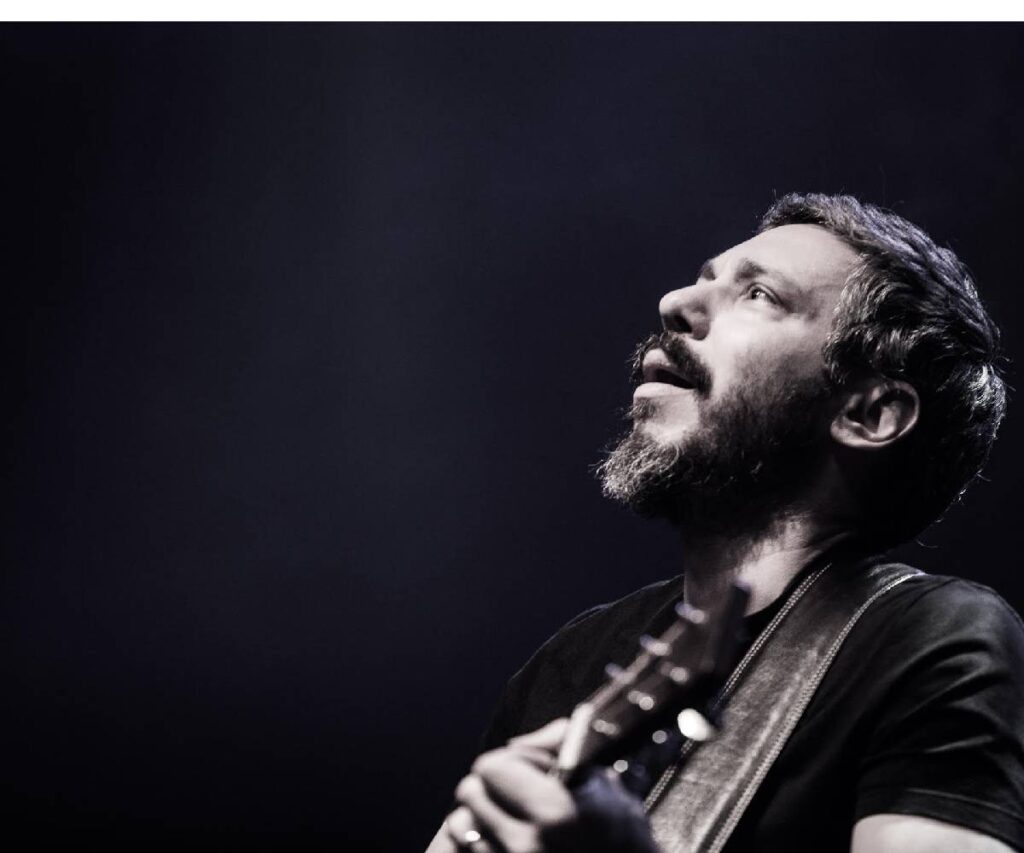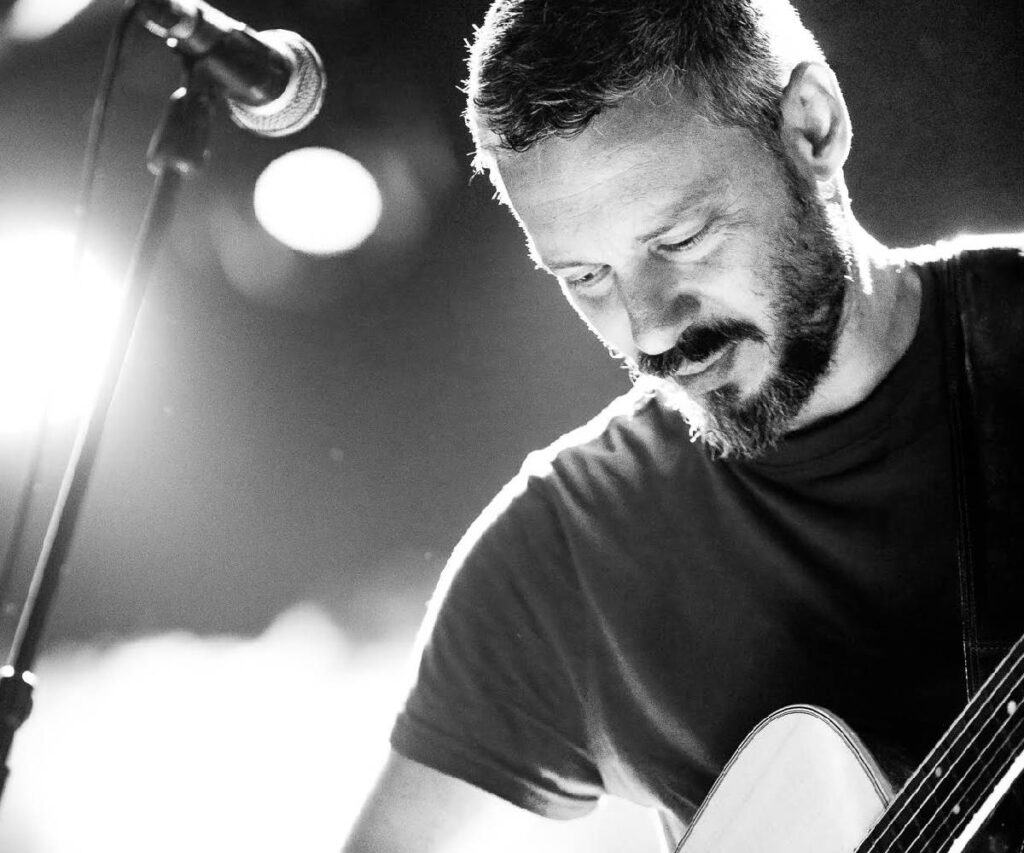Interview with Marni Hadjiemanouil
– Your first concert in Scandinavia – in Stockholm and Gothenburg; how does it feel? What are the first songs you brought with you in your luggage?
I am very happy about the trip and look forward to it! It is true that it is the first time I am holding a concert in Scandinavia. I cannot explain how I have not yet had the opportunity to visit your parts when I have traveled all over the world all these years. But, it is about time now that I share with you what is important to me: feelings, memories, dreams and songs. The program includes material from my discography, some covers of traditional songs and some songs by other artists that I love. I will play electric and acoustic guitar, without any other musicians on stage. I often perform alone, as it brings me back to my songwriting roots. In these solo concerts, the songs have a chance to be heard just as they were written.
– You have held concerts all over the world; New York, Indiana, Chicago, London, Germany, UK, Belgium, Spain, Romania, France, Georgia, Argentina, Egypt. How important is it for an artist to bring in as many different cultures as you bring in on stage? Is it true that music has no boundaries and that it unites us?
Music, and especially song, has been man’s life force throughout the ages. It is a fundamental, common characteristic of all people and the need of all peoples to express themselves and coexist through song. From Australia to Portugal and from Argentina to Scotland, my desire is always to share with my fellow human beings a sacred moment that cannot be repeated. The only way to do it honestly is to be myself, in a creative interaction with each country’s character and each listener. This real, living relationship turns the concert into a ritual in me and makes me part of the whole, not as the protagonist, but as part of a group that creates something in common.

– An artistic family, like yours, is a family that produces culture; my feeling is that this need for expression, which comes effortlessly to the public, to some extent shapes their general perception, but also their aesthetics of things. What direction does your own interpretation of life take through your Art, while it helps us find our inner world?
I grew up in a house – painting workshop. Art is not something that exists separately from our life. We shape art and art shapes us. An expression that is often used when someone talks about himself that “as an artist and a human being” has always seemed funny to me. I have never been able to tell these two apart. I believe that every human being is an artist. For example, I consider the listener not a passive receiver but an active creator. His choice to listen to one song and not another, to attend one concert and not the other, even the manner in which he attends a concert, shapes and demonstrates, in addition to his personal aesthetic, our collective cultural standing as well. Personally, I always write as a listener: I want to hear a song that doesn’t exist, so I have to write it.
-Your text is deep, emotional; one could say that when you hear it, you have to … “face the music”. It seems that you are looking for a release, a salvation… When do you have these “holy” moments when you build and deconstruct yourself? When do you write about the journey, the time and the pain? Is it when the walls close in on you?
Rather when it’s the other way around… My room is still small, only 9.5 square meters. In it there are many guitars, basses and lutes hanging from the ceiling, 4 analog synthesizers, a piano, endless books, a collection of baroque flutes, acoustic and electronic percussion instruments, recording equipment, speakers, pedalboards, computers, papers, memorabilia, and objects. I barely have room to walk across the room to take my seat. And yet, in the evenings, when the children are asleep and when no one expects anything from me, this cramped space becomes huge! I write when life is absent. On the contrary, when life is present, it seems somewhat unfair to give it up in order to isolate and describe it.
– Your collaborations with the arts and cultural community are extremely thorough; you have collaborated with great creators who have left a historical mark on the world of music, such as Yannis Spathas, Dionysis Savvopoulos, you have performed songs by Manos Hatzidakis, Manos Loizos, collaborated – among others – with Mikis Theodorakis Folk orchestra. After such an art community, the artist moves forward. So what have you learned all these years that you pass on to your audience?
To a large extent, we are the people we meet. I have been fortunate to meet many of the people who have influenced me through their work; composers, lyricists, bands, musicians, Greek and foreign artists. But I often realize that the encounter with their work played a bigger role for me than the personal acquaintance or collaboration. Their great gift is the world they created and gave us, which defines our existence.
– Man and his emotional life, pain, war, love, need, prayer, forgiveness, everything that controls us and floods us with guilt, tears, redemption, compassion, is pervasive in your art, both text and music. How do you receive the love people give you and people’s loyalty? Does it have to do with the deeply human nature of your songs?
I feel great gratitude towards the audience. It has accepted me, made me ‘one of the gang’, agreed to travel with me, and taken me to places I would never have visited otherwise, both in real life and internally. I am a closed person, although I seem sociable. I constantly have a need to shut down and at the same time I constantly struggle to get out of the labyrinth of the self. I often think people accept me because they are friendly. Maybe they sense my anxiety to escape my confinement, to get out of myself and share something with them. So they give me this opportunity by giving me the gift of coexistence, which I wouldn’t have had without the song.

-You have a personal relationship with the theater that goes back to 1993, when you participated in Epidaurus. You have also set poetry for the theatre, including by the important Greek poet Nikos Gatsos. Are you looking during your life for opportunities to be close to the theater?
I no longer act as an actor, I did it little and sporadically in my life, despite my studies at the National Theater School and my love for theater and film. Whenever I get the chance, I prefer to write music for theater performances in Greece and elsewhere, rather than act as an actor. I would also be interested in writing music for film.
– Does Cyprus – your homeland – the place of the first years of your inner search, follow you everywhere? Is it – for example – a personal need that exists in each of your concerts to share with the rest of the world the history of this much tried island, through the folk songs of Cyprus?
Cyprus is a part of me. If I want to tell the public who I really am, then it is impossible to exclude Cyprus. I love the place, the history, the language, the music, and the people. I am half mainland Greek – my mother is from Thessaloniki – but I am saddened by Greece’s attitude. Cyprus is considered to be too far away to be understood or even get to know it, but close enough to cause tragedies. Singing, by its very nature, bridges distance. Maybe that’s why I sing Cypriot songs. They help me go back there and introduce my place to people who don’t know about it.
-What made you stay in Greece? Have you ever really thought about moving somewhere else?
I have never stopped thinking about moving. But I love Greece deeply. Not the Greek state, but the places, the culture, the people. When we should have moved abroad, the financial crisis came. Then I felt the need to stay and work here. It was not that I thought anyone had anything to gain from my stay here, however, I felt it my duty not to leave the country in this difficult time, as I had the privilege of being able to live here. In retrospect, I think it was the wrong decision. I missed the chance to yearn for Greece.
